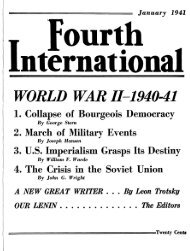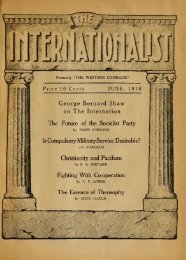The Stalin school of falsification - Marxists Internet Archive
The Stalin school of falsification - Marxists Internet Archive
The Stalin school of falsification - Marxists Internet Archive
You also want an ePaper? Increase the reach of your titles
YUMPU automatically turns print PDFs into web optimized ePapers that Google loves.
<strong>Stalin</strong> School <strong>of</strong> Falsification - Chapter 13<br />
allow that Voroshilov is right. <strong>The</strong> question arises: Why did the party tolerate Trotsky and the entire<br />
Military Council <strong>of</strong> that time? Why was not Trotsky removed during the years <strong>of</strong> the civil war?<br />
Furthermore: Why were victories gained on all fronts under the leadership <strong>of</strong> the "then" Military Coun<br />
cil? After all, Military Councils are intended for war and not peace! Why were neither <strong>Stalin</strong> nor<br />
Voroshiloy called upon to lead the army, but, on the contrary, removed time and again from difficult<br />
sectors? By their declarations the <strong>Stalin</strong>ists compromise only the party, the Central Commit tee and<br />
Lenin. If the myths the <strong>Stalin</strong>ists record were true, it would mean that the C.C. was gnilty <strong>of</strong> the gravest<br />
crimes towards the revolution. For it must be borne in mind that all these things took place in the period<br />
<strong>of</strong> cruel civil war and not in peace-time when all the Voroshilovs are freely able to "refresh."<br />
But that is not all. Summarizing the "historic" trip <strong>of</strong> <strong>Stalin</strong> to Vyatka, Voroshilov writes: "In<br />
consequence <strong>of</strong> all these [?] measures [<strong>of</strong> <strong>Stalin</strong>-Dzerzhinsky] not only was the further <strong>of</strong>fensive <strong>of</strong> the<br />
enemy halted, but in January ..... . Uralsk was captured." Here is a zeal truly exces sive! "In<br />
consequence" <strong>of</strong> <strong>Stalin</strong>'s having safely visited Vyatka in January 1919, a thou8and kilonirters away-one<br />
thousand !-from Vyatka, Uralsk was captured. . . . In the month <strong>of</strong> January, i.e., at the very moment when<br />
<strong>Stalin</strong> Dzerzhinsky arrived in Vyatka there could not have been any results even in Vyatka itself.<br />
("Results"-that is easier written than done.) Or is it perhaps precisely for that reason that Voroshilov had<br />
to go to Uralsk to excavate them?<br />
We shall not dwell in detail on Voroshilov's next chapter entitled "Petrograd," we confine ourselves<br />
merely to three points.<br />
1. We shall not undertake to judge the extent to which <strong>Stalin</strong> was instrumental in recapturing Krasnaya<br />
Gorka (it had been evacuated without any cause, and was "retaken" four days later without any<br />
difficulty). Voroshilov confines himself to vagne generalities. But this particular episode is entirely<br />
insignificant.<br />
2. <strong>The</strong> Krasnaya Gorka episode pertains to June 1919. At that time, <strong>Stalin</strong>, according to his apologist,<br />
"liquidated a most dangerous situation beneath Petrograd." Yet the advance <strong>of</strong> Yudenich and the collapse<br />
<strong>of</strong> the Seventh Army (in which <strong>Stalin</strong> functioned) began precisely after the above mention~d<br />
"liquidation," attaining its most critical stage in October 1919. From June to October the situation <strong>of</strong> the<br />
Red Army beneath Petrograd became worse and worse. Under these circumstances, to say that <strong>Stalin</strong> had<br />
"liquidated" the danger is, to put it mildly . . . risky. <strong>Stalin</strong> did very little beneath Petrograd, and indeed<br />
there was probably not much that he could have done: this front was at that time tem porarily neglected.<br />
But in that case why is <strong>Stalin</strong> depicted with the halo <strong>of</strong> a "savior"?<br />
3 . <strong>The</strong> point, however, is that Voroshilov is here resorting to juggling with words. <strong>The</strong> entire and most<br />
transparent trick lies in the use <strong>of</strong> the word "Petrograd." In the history <strong>of</strong> the civil war there is only one<br />
decisive "liquidation <strong>of</strong> the most dangerous situation beneath Red Petrograd"~and that is the victory over<br />
Yudenich in October 1919, which took place four months after <strong>Stalin</strong>'s excursion to Petrograd. This is<br />
not a matter <strong>of</strong> common knowledge, but, on the other hand, every body is acquainted with the fact that<br />
Yudenich was liquidated. That is precisely the foundation upon which Voroshilov's trick is built: "To<br />
assign" to <strong>Stalin</strong> the actual liquidation <strong>of</strong> the danger, i.e., that danger with which <strong>Stalin</strong> had absolutely no<br />
connection.<br />
Incidentally, <strong>Stalin</strong> himself in his own time appraised his journeys with much less assuranca -- and that is<br />
hardly to be wondered at, since it was ten years ago! Here, for example, is what he wired in reply to a<br />
proposal <strong>of</strong> the C.C. that he go to the Southwestern Front: "February 4th, 1919. To the C.C. <strong>of</strong> the Party.<br />
http://www.marxists.org/archive/trotsky/works/1937-st2/sf13.htm (7 <strong>of</strong> 14) [06/06/2002 15:07:18]

















